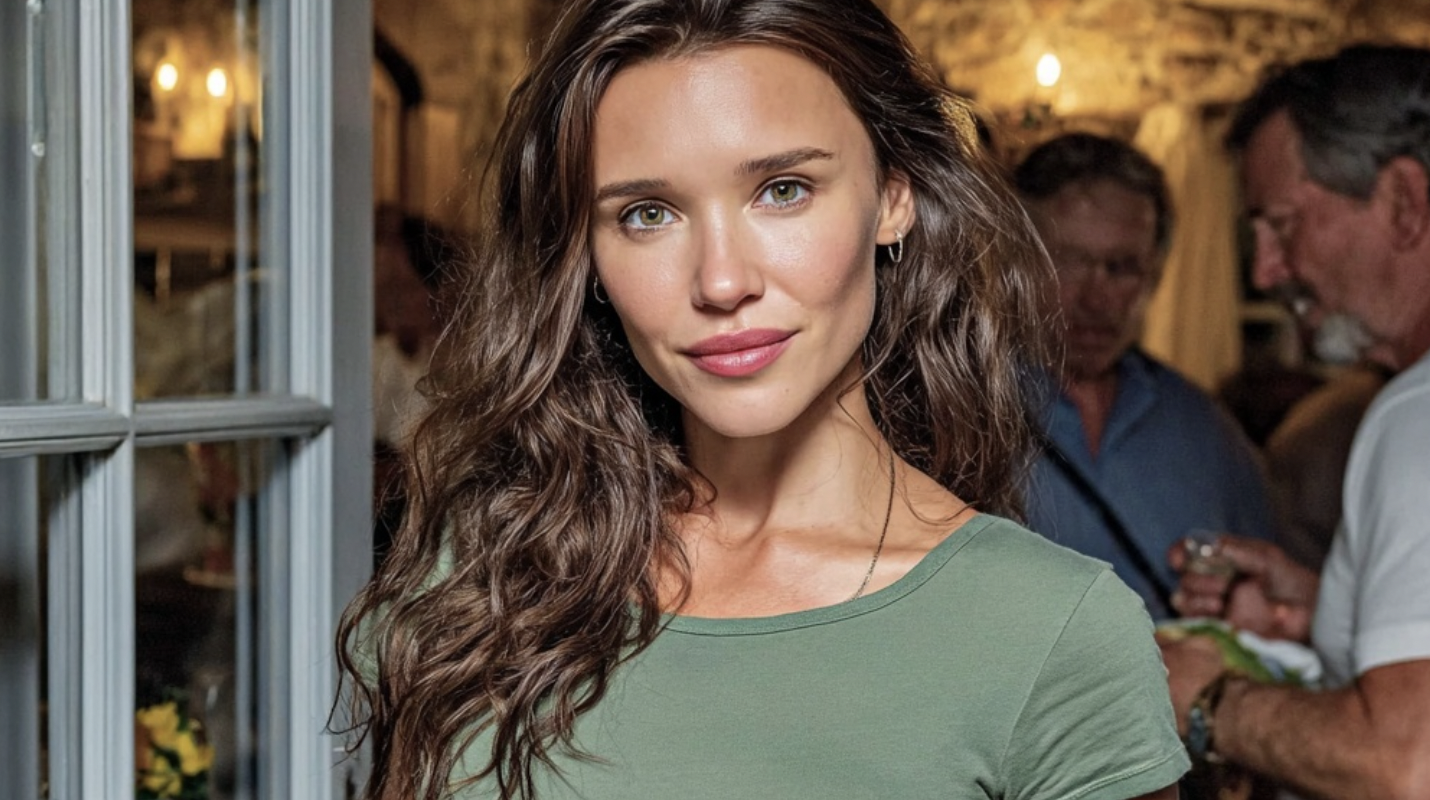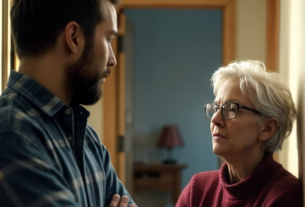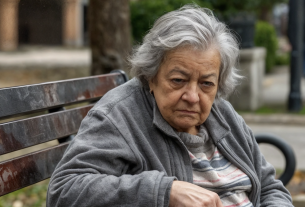— “And what is this nonsense?”
My mother-in-law’s voice, Raisa Igorievna’s, landed like a slap, even though it was quiet. She stood on the threshold of my kitchen like an inspector, arms crossed, thin lips pressed tight.
I had just pulled a baking sheet out of the oven. The air filled with the aroma of herbs, melted cheese, and golden pastry. My first test batch of pirozhki—little hand pies—with spinach and Adyghe cheese. My small hope.
“I decided to try,” I said. “To do something I actually enjoy, Raisa Igorievna.”
She stepped in slowly, her gaze gliding over the spotless room, yet her face looked as if she’d walked into a den of vice.
“Enjoy?” She sniffed. “You got fired from a respectable position as a financial analyst, and now you enjoy messing around with flour? Kirill already told me everything.”
Her words were tiny, but they pricked like needles. “Fired” wasn’t quite right. Laid off—the whole department. A crisis. But in her mouth it sounded like a shameful brand, my personal failure.
“This is a chance to start my own thing,” I answered quietly, with a stubbornness that surprised even me.
Raisa Igorievna came up to the table and picked up one pirozhok between two fingers—daintily, as if it were a dead mouse. She lifted it to her sharp nose.
“What’s that smell? Some kind of grass. You might as well have made them with nettles. Normal women bake with cabbage, with meat.”
I looked at my husband, Kirill, who walked in behind his mother. He gave me an apologetic smile and gestured—don’t argue, just endure.
That was his usual stance: the human buffer who always smoothed edges, even when those edges were digging into me.
“Mom, this is trendy now,” he tried to mediate. “Author’s cuisine, gourmet fillings.”
“Gourmet?” Raisa’s lips curled into a smirk. “Katya, listen to me, an old woman. While it isn’t too late—drop this foolishness. Your strange little flatbreads—no one will want them for free.”
She didn’t just say it. She passed sentence. Cold, final, without appeal.
I looked at my flour-dusted hands. At those golden, perfect—in my eyes—pirozhki. And I felt something tighten inside. Not hurt. Something else—hard and stubborn.
“I think people will want them,” I said, louder than I expected.
Raisa didn’t even lift an eyebrow. She simply looked at her son, and there was an ultimatum in her eyes.
“Kirill, your wife has always had her fantasies. But this is too much. A man needs to eat meat, not… grass in dough. At least tell her this leads nowhere.”
Kirill hesitated. He came over, took a pirozhok, bit into it, chewed without expression, staring at the wall.
“Well… it’s not bad,” he shrugged. “But Mom’s right, Katya. This isn’t serious. Better look for a normal job. Why do we need the risk?”
And that hurt more than a thousand of his mother’s pinpricks. Because she was a stranger. And he was mine. Was. In that moment, he didn’t choose me.
Raisa won. She gave me a condescending, almost sympathetic look and turned to leave.
“Good thing you’ve come to your senses. Come on, son, I’ll fry you some proper cutlets at home.”
They left. I was alone in the kitchen, deafened by the smell of my failure. I picked up a still-hot pirozhok, brought it to my mouth, but couldn’t bite. A lump clogged my throat.
I didn’t yet know that this evening would be a beginning. The beginning of everything.
I sat right on the floor, leaning against a cabinet. The baking sheet with the cooling, supposedly unwanted pirozhki stood on the table like a monument to my stupidity.
The door clicked softly. I didn’t turn. Footsteps. Kirill had come back. He stood for a moment, then sat on the floor beside me.
“Forgive me,” he said so quietly I barely heard. “I’m such an idiot. A coward.”
I was silent. I didn’t even have the strength to be angry. Only that cold, ringing emptiness.
“I saw you through her eyes—how she looks at you—and by force of habit I got scared. Scared of her anger, her words. I’ve always been afraid. Since childhood. It’s easier to agree than to argue with her. It’s reflex, you understand? To say what she wants to hear, just to make her stop.”
He took my hand. His palm was warm.
“Then I walked her to the car. She sat there, all pleased with herself, the victor… And I looked back at our house, where you were. And it hit me—like plunging into ice water.
“She’ll drive off, and I’ll stay. With you. And I had just betrayed the most important person in my life. Over cutlets. And a fear that’s sunk into my bones for years.”
He lifted his eyes, and for the first time in a long while I saw not guilt but real pain and resolve.
“Katya, forgive me. Please. What I said—it was a lie. I just… parroted her.”
He got up, took a pirozhok from the table—the same one he’d bitten into indifferently five minutes ago—and started eating. Slowly, thoughtfully, looking me in the eye.
“This… this is unbelievably good,” he said. “Seriously. Unusual, but very tasty. Juicy, aromatic. Katya, it’s brilliant.”
He meant it. I could see that.
“We’re going to do this. Hear me? You’ll bake, and I’ll handle everything else. I’ll find buyers. I’ll be your loader, your courier, your accountant—whatever it takes. Just don’t quit. Don’t let her win. Don’t let me turn into that weakling again.”
I looked at him, and the ice inside began to crack. He wasn’t just apologizing. He was offering himself—his belief, his help—all of himself.
From that evening on, everything changed. We became a team. We pulled together our modest savings.
I developed five more fillings: braised beef with juniper, mushrooms in a creamy sauce, pumpkin with ricotta… Kirill set up a simple page on social media and photographed everything so well it made your mouth water.
The first order came three days later: a dozen pirozhki. I baked; Kirill drove them clear across town. He came back with shining eyes.
“They loved them! Said they’ll order more for their office party!”
But Raisa didn’t sleep. She called every day.
“Well, Kirill, has your little cook found a real job yet? No? I knew it. Zinaida Petrovna’s son is looking for a secretary. I’ll get your Katya in by pulling strings, fine.”
“Mom, she’s busy. She has her own business,” Kirill answered calmly, and I saw how hard that was for him.
“Business?” her poisonous laugh crackled in the receiver. “Playing with flour isn’t a business, it’s idleness. You’ll be out on the street with her schemes!”
She switched tactics. She “happened” to meet our neighbor, Aunt Valya.
“My poor boy, he’s wasting away. Katya doesn’t feed him at all—she’s always fussing with that baking. Selling to who knows whom while her husband sits hungry.”
And soon Aunt Valya was eyeing me with pity, trying to thrust a jar of broth into my hands.
We arranged to supply a small coffee shop near home. The owner, a young guy, was thrilled. A week later he called Kirill, hemming and hawing.
“Guys, I’m sorry, but I can’t take your goods anymore. Some woman came in… said she’s a relative of yours. Told me you make everything in unsanitary conditions, practically on the floor. I have a reputation, you understand…”
We knew who it was.
That evening we sat in the same kitchen. Our week’s earnings lay in front of us. Not much, but ours. And we felt not defeat, but a cold, hard anger.
“She won’t stop,” I said.
“I know,” Kirill answered, squeezing my hand. “Then we need to get bigger. Stronger. So her poison simply can’t reach us.”
Kirill’s idea was simple and risky: the city’s gastronomic festival. A huge venue in the main park, hundreds of vendors, thousands of visitors. Our chance to announce ourselves loudly and at once.
We poured everything into it. Rented a tiny booth, bought ingredients with our last money.
Night after night I baked, perfecting every recipe. Kirill designed the packaging, printed flyers, handled all the details. We were exhausted—and happy.
On festival day we arrived three hours before opening. Our little booth, which we named “Piro-Guide,” looked stylish and cozy. Mountains of golden pirozhki sent up aromas that made even other vendors drool.
Half an hour before the start, as we were setting out the last price tags, they showed up: two stern women in uniforms… and Raisa Igorievna. She stood a step back, arms folded, a look of absolute triumph on her face.
“Hello,” one of the women showed her ID. “Sanitary inspection. We received a complaint about your booth. Acute food poisoning. They say they bought a meat pirozhok from you yesterday and the whole family fell ill.”
The ground dropped out from under me. Yesterday? We hadn’t sold anything yesterday—we were preparing!
“There must be some mistake,” Kirill began, his voice trembling. “We’re only opening today.”
“There’s a complaint; we’re obligated to check,” the second cut him off, though with less zeal now. “We’ll have to seize all your products for testing. The booth will be sealed pending investigation.”
Sealed. That would be the end. The festival ran for only two days. Lose today and we’d lose everything—money and hope alike.
Then I looked at my mother-in-law. She wasn’t hiding her joy. She looked at me, at my pirozhki, at our small but vital world, and her eyes said, “Told you. I’ll destroy you.”
And in that moment something happened. A frightening calm settled over me. The panic, the fear—gone. Only a ringing, absolute clarity remained.
I turned to Kirill, who was glancing helplessly from me to the inspectors.
“Kir, film.”
“What?”
“Take your phone and film everything. Go live. Right now.”
He blinked, but obeyed. A second later he had the phone up, streaming.
I stepped toward the inspectors, who were already pulling out some forms.
“Good afternoon. My name is Ekaterina Romanova. This is my business—I built it from scratch. I understand you’re doing your job. But the complaint you received is a lie.”
I spoke loudly and clearly. People began to gather around our booth—other vendors, early visitors.
“We have certificates for all our products. I have my health certificate. We wear gloves. Most importantly, we started work ten minutes ago. We physically could not have poisoned anyone yesterday.”
I turned and looked straight at Raisa.
“And the complaint was filed by this woman—my mother-in-law, Raisa Igorievna Volkova—who from day one has done everything she can to destroy my business. First she spread rumors among neighbors.
“Then she torpedoed our contract with a coffee shop. And today she decided to go further by filing a knowingly false report.”
The crowd murmured. Raisa went pale. She hadn’t expected this. She was used to me keeping quiet and enduring.
“Mom, why?” Kirill’s voice wavered off-camera, but he kept filming.
“I… I’m just worried about you!” she stammered. “This is all dangerous—you’re not professionals!”
“Your ‘worry’ is pure envy and malice,” I said evenly. “You simply can’t accept that I’m succeeding—doing what, apparently, you never had the courage to try.”
I turned back to the growing crowd.
“I invite everyone—try our pirozhki. Free, right now. Decide for yourselves whether they can poison anyone. And as for you,” I looked at the inspectors, “please conduct your inspection, here and now. We have nothing to hide.”
I took a beef-and-juniper pirozhok from the counter and offered it to the lead inspector.
“Please. I’m proud of this one.”
She was flustered, but took it. Bit. Raised her brows in surprise. Her partner, seeing the situation sliding out of control—the phones trained on them, Raisa trying to slip away in disgrace—said crisply:
“We’ll do a visual inspection.”
They stepped into our booth. Five minutes that felt like forever. The crowd stayed. Kirill kept filming. They came out.
“No violations found,” the senior said dryly. “As for the knowingly false call, we’ll address that separately.”
And they left. But the people stayed. And then something happened we couldn’t have imagined. A line formed at our booth.
Ten people, then twenty, then fifty. Kirill’s live stream hit thousands of views within an hour. The story of “the badass pirozhki and the evil mother-in-law” became a local legend.
We sold everything. Absolutely everything in four hours. People kept coming; they didn’t just want food—they wanted to support us. It was unbelievable.
That evening, driving home wrung out but utterly happy, Kirill’s father, Semyon Zakharovich, called. I’d always had a steady relationship with him—he never meddled.
“Kirill, I saw the video. Your mother locked herself at home, crying—says you shamed her. But I want to say… Katya, you hearing this? You did great. I’m proud of you. Don’t count on your mother; talking to her is useless. She doesn’t hear herself. Just hold steady.”
And that mattered even more. He didn’t promise to fix our problems. He simply stood on our side.
A year passed.
The festival video made us known. Several investors reached out. We chose the most sensible one and opened a small café—“Piro-Guide.”
Right in the city center. Stylish, cozy, with an open kitchen where I conjured up new fillings. Kirill ran everything else.
We worked like the possessed. But it was ours. Every morning, unlocking the door, I felt I was where I belonged.
Today was an especially hectic Saturday. I ran outside for a minute to gulp fresh air. A line stood at our entrance—twenty people at least. They chatted and laughed, anticipating hot pastries. And I saw her.
Across the street stood Raisa. She’d grown thinner, older. She looked at the sign, the line, the warm glow of our windows. There was no hate in her eyes now.
Only emptiness—and something like bewilderment, as if she still couldn’t believe that this bright, successful world had grown from those “strange flatbreads” she’d condemned.
She watched people coming out with our branded bags, smiling. Watching them eat what I had created.
And then my heart skipped. In the line, near the door, stood Semyon Zakharovich. My father-in-law. Waiting patiently like everyone else. He saw me, smiled, and waved. He hadn’t come as family.
He’d come as a customer—to buy his daughter-in-law’s pirozhki.
Raisa saw him too. Her husband standing in line for the very thing she had tried to destroy. It wasn’t even a blow. It was a period. The final full stop in her war. She turned silently and walked away, shoulders hunched.
And I realized I’d forgiven her long ago. Because her poison, her disbelief, her malice had become the fuel that kept us moving forward. Sometimes the best victory isn’t revenge. It’s building something that can’t be torn down.
Epilogue. Seven years later.
We were sitting with Kirill on the veranda of our country house. The evening was warm, smelling of pines and cut grass.
A pitcher of lemonade stood on the table, and at the far end of the yard our five-year-old daughter, Maya, was laughing with Semyon Zakharovich.
“Piro-Guide” never became a giant corporation. But it was a steady, respected chain of three cafés in different neighborhoods. The first became our home.
The second, two years later, tested us for strength. The third we opened on a franchise with our former staff. I hadn’t stood at the stove in a long time—I created, I invented, I trained the team. Kirill turned out to be a brilliant manager.
He built a solid family business on my pirozhki.
We saw little of Raisa. After that incident, Semyon gave her an ultimatum.
She chose pride. They didn’t divorce, but lived like neighbors. He came to us often—adored his granddaughter. She—never.
A couple of times a year she called Kirill. The conversations were short and empty. Weather, health. Not a word about us, about Maya, about the business—as if none of it existed.
A few months ago Kirill went to help his father with some repairs. He came back quiet and thoughtful.
“I wandered into Mom’s room by accident. On her desk… a folder. Thick. Inside—newspaper clippings, printouts from the internet. All about you. About ‘Piro-Guide.’ Every article, every interview.”
I looked at him in surprise.
“Why?”
“I asked too. At first she said nothing, then she told me, very softly: ‘I want to understand where I went wrong.’ And she showed me her old sketchbook. In her youth she dreamed of becoming a fashion designer. She drew amazingly. But her parents said it was ‘not serious’ and sent her to study economics. She worked as a bookkeeper her whole life. Hated every day of it.
“And I understood everything. She wasn’t looking at you. She was looking in the mirror—at her own ruins.
“At her unfulfilled dream. And my little pirozhki business became a living reproach to her, a reminder of what she hadn’t dared to do. It wasn’t envy of my success. It was hatred of her own cowardice.”
That evening on the veranda I thought about it. About how her words—“No one will want your pirozhki”—weren’t addressed to me. She was saying them to herself, to the young woman with the sketchbook.
She wanted to author my failure and ended up co-authoring my triumph, without meaning to.
I looked at my husband, at my laughing daughter, at the grandfather who loved us.
“You know, she was right about one thing,” I said quietly.
Kirill looked at me in surprise.
“About what?”
“They really were risks. Huge ones. We could have lost everything. But sometimes the biggest risk is not to try—to stay where you’re miserable just because it feels safer.”
He smiled and covered my hand with his.
“Then they were the right risks.”
Yes. This was our life. Built not in spite of, but thanks to. A story not about pirozhki, but about the fact that sometimes you have to hit bottom to push off and soar. And those who pushed you down will remain there, at the bottom, rereading clippings about your flight.



